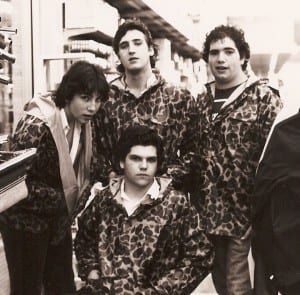
Combat Zone.
I didn’t bother with local girls, as Graham Parker advised on Squeezing Out Sparks, at least those who weren’t already dating the new guy on my baseball team who also happened to take my primary position, first base. I was exiled to left field, about as far away as first base already felt to me in sexual terms. This guy, occupying both my bag and my local crush’s lips, was so kind and sweet I had to applaud him for both conquests.
“Don’t bother with them, they don’t bother me,” sang Parker of the local girls, but I desperately wanted to hear girls talk, as Dave Edmunds sang on another perfect record I picked up at that record store on Cottman Avenue. I did fine with adult women from all walks of life, easily harmonizing with female teachers; my Mom’s network of fun, bitter divorcees; and the women at the baby clothes manufacturer, where I worked summers. When it came to girls my own age, however, I was tone deaf. There was a trio of smart girls in my class whom I related to through student government activities. Sometimes they took pity on me in science classes and served as my lab partner. These girls inevitably carried the load on the completion of the lab report. They must have taken turns helping a few of us scientifically dense boys. Perhaps I could have gotten closer to one of these Ivory Soap girls, but as they looked me in the eye and spoke to me in a straightforward, intelligent manner, I would get distracted by the hint of nipple peeking through another girl’s shirt at the next lab counter.
As I slowly made inroads into our school’s music scene I found myself capable of having conversations with stoner girls and other malcontents of the fairer sex. Music was a bridge discussion topic to certain girls. They, too, had their favorite songs off Who and Beatles albums. They could talk about bands I didn’t quite get, like Led Zeppelin and Jethro Tull, without making that high-and-mighty “uh, heh-heh” sound that guys did. When girls loved a song they were more likely to express how the song made them feel, how the song related to something they were going through, rather than flex in the glow of the song’s empowering majesty. “This song kicks ass!” a boy was likely to shout over Zeppelin’s “Ramble On,” insinuating a transference of rock superpowers that empowered him to kick ass.
Girls didn’t lean on an artist’s credentials, the way guys did when they felt compelled to point out that a certain musician was once lauded in a Rolling Stone interview by Pete Townshend (eg, Peter Frampton, Joe Walsh) or was “classically trained.” For instance, I might ask one of my stoner friends, “What am I missing in Frank Zappa? I don’t get him.”
The guys would fire back, “Oh, Zappa’s classically trained!”
As if either of us listened to classical music.
The rare girl who liked Zappa might, instead, get to the heart of the matter and remind me of the obvious: “Well, Zappa’s pretty funny!”
For the millions of teenage boys who didn’t actually listen to classical music, the fact that upstart moronic cock-rockers like Eddie and Alex Van Halen were classically trained carried a load of weight. Talking music with girls was all right, provided I could steer them away from gushing over Jackson Browne.


